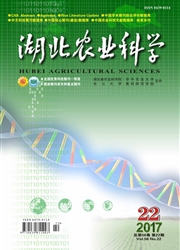

 中文摘要:
中文摘要:
为探讨镉污染对武汉城郊菜地土壤氮素转化和流失的影响特征,以硝酸盐高、低积累小白菜品种(L45和H64)为试验材料,研究了镉污染下小白菜中镉、硝态氮、全氮含量,土壤中镉、硝态氮、全氮含量,以及淋失液中硝态氮含量和土壤中氧化亚氮排放量。结果表明,小白菜具有一定的耐镉性,L45比H64地上部镉含量高27.7%,说明L45比H64更敏感。随着镉浓度的升高,小白菜体内硝态氮含量呈先增后降的趋势,说明低浓度的镉促进了小白菜体内硝酸盐的积累;低浓度的镉还增加了土壤硝态氮的淋失。镉浓度的升高对土壤和植物体内全氮含量则无显著影响,说明镉污染对土壤中氮肥的主要利用形式硝态氮影响更显著。随着镉浓度的增加,土壤氧化亚氮的日排放量显著增加。
 英文摘要:
英文摘要:
A high-nitrate accumulator (H64) and a low-nitrate accumulator (IA5) [Brassica campestris L.ssp. Chinensis(L.)] were used to study the effects of cadmium polhion on the nitrogen leaching and soil nitrogen transformation of suburban veg- etable soil of Wuhan. The contents of cadmium (Cd), nitrate, total nitrogen in Chinese cabbage and soil, the content of ni- trate in leached water, and the emission of nitrous oxide from soil were analyzed. Results showed that two Chinese cabbages had certain abilities of tolerance to Cd toxicity. The cadmium content of shoots of H64 was higher than that of IA5 with 27.7%, indicating that L45 was more sensitive than H64. The contents of nitrate of two Chinese cabbage increased first and then decreased with the increase of Cd levels. The leaching of nitrate increased at low level of Cd. No significant differences were found in total nitrogen of Chinese cabbage and soil. The emission of daily nitrous oxide from soil increased significantly with the increase of the cadmium concentration in soil.
 同期刊论文项目
同期刊论文项目
 同项目期刊论文
同项目期刊论文
 Effect of sulphate onselenium uptake and translocation in rape (Brassica napus L.) suppliedwith sele
Effect of sulphate onselenium uptake and translocation in rape (Brassica napus L.) suppliedwith sele 期刊信息
期刊信息
